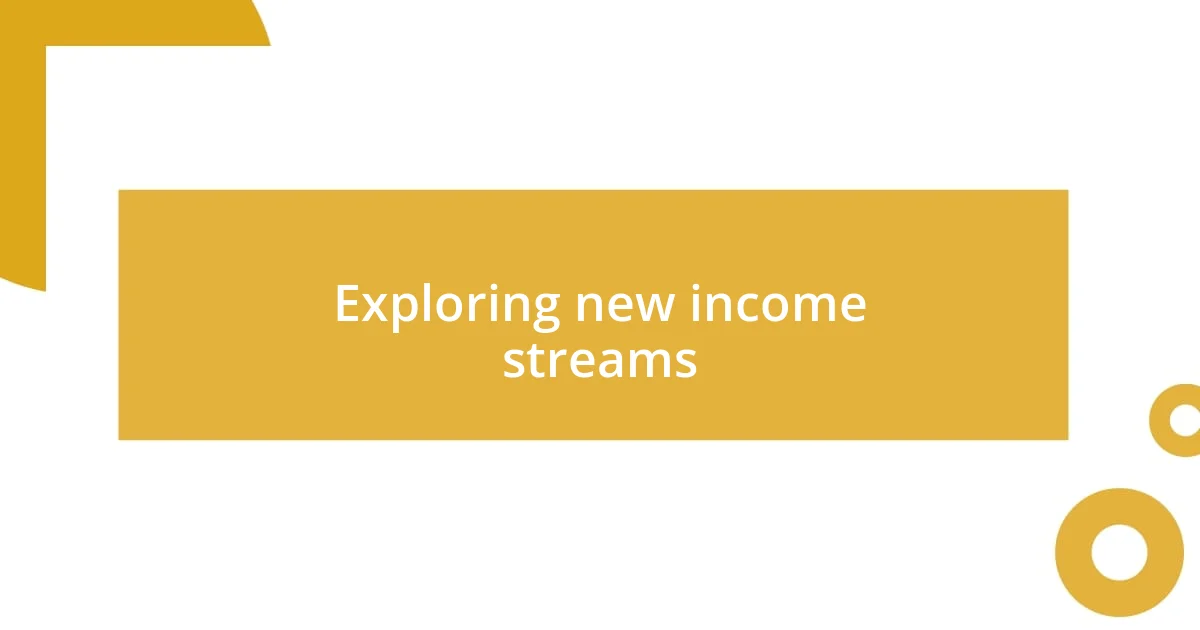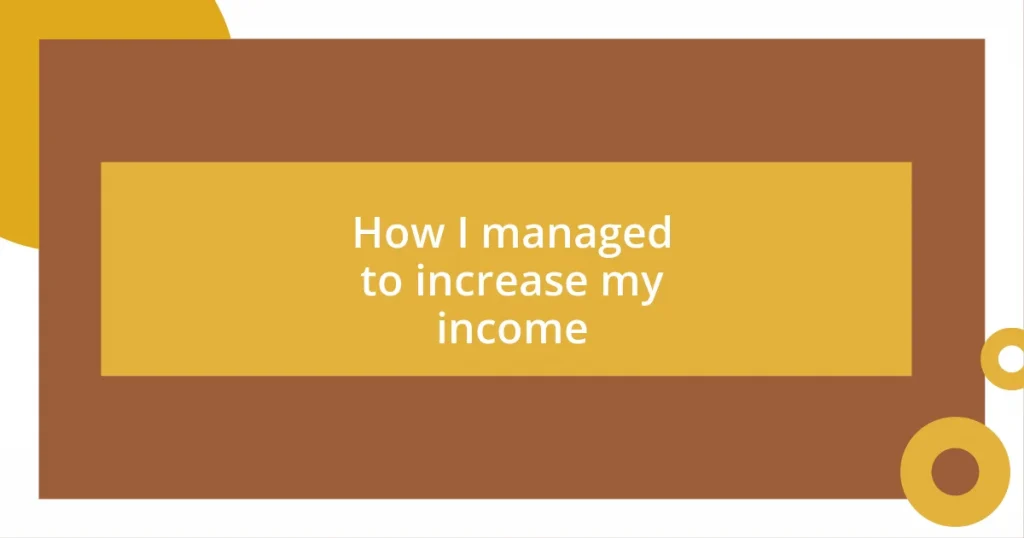Key takeaways:
- Recognizing and managing expenses through budgeting apps allowed for better financial control and insight into spending patterns.
- Setting specific and measurable income goals provided clarity and motivation, leading to a more focused approach in achieving financial targets.
- Networking created opportunities for collaboration and new income streams, highlighting the value of genuine connections and open dialogues in professional growth.

Understanding my financial situation
Understanding my financial situation wasn’t an overnight process for me; it felt more like peeling back layers of an onion. I realized that I had been sidestepping the reality of my expenses, often letting them accumulate like an uninvited guest. When I sat down with my bank statements, I couldn’t help but ask myself, “Why did I spend so much on takeout last month?” Recognizing those patterns was the first step toward taking control.
One pivotal moment was when I used a budgeting app to track my spending for a couple of months. The graphs were revealing—my discretionary spending was outstripping all reason, and I felt a mix of surprise and disappointment. It was hard to face the reality that tiny purchases added up to significant numbers. I thought, if I wasn’t careful, would I ever break this cycle?
I also started analyzing my income streams more critically—not just my primary job, but also side gigs and passive income opportunities. I remember looking at how much I earned versus how much I spent and feeling a tug of frustration. “Why am I not harnessing my skills better?” It pushed me to consider how I could leverage my existing talents in a way that would bring in more money, ultimately shifting my perspective on what was possible.

Setting clear income goals
Setting clear income goals is crucial for anyone looking to enhance their financial landscape. I remember the day I sat down with a notebook and started jotting down specific numbers. I wanted to be precise—no vague aspirations like “I want to earn more.” Instead, I focused on actionable figures, like, “I want to make an additional $1,000 a month.” This clarity not only fueled my motivation but also helped me devise a tangible plan to reach those targets.
Here are some steps that worked for me when setting my income goals:
- Identify your current income and break down potential increases by percentage or dollar amount.
- Set short-term (3 to 6 months) and long-term (1 to 3 years) goals to keep the momentum.
- Write down your goals and review them regularly to stay accountable.
- Celebrate small milestones to stay motivated; perhaps treat yourself when you hit a quarterly target.
- Adjust goals as needed—it’s okay to evolve those numbers if your circumstances change!
With these strategies, I found that my focus sharpened, and my path to achieving my income goals became clearer. It felt like turning on a light in a dimly lit room—I could finally see my way forward.

Exploring new income streams
Exploring new income streams was a game-changer for me. I remember feeling a bit daunted at first, but the prospect of diversifying my income built a sense of excitement within me. I initially dabbled in freelance writing—something that had always been a side passion. The moment I landed my first gig, a thrill surged through me. It wasn’t just about the extra cash; it felt empowering to turn my hobby into something profitable.
As I continued down this path, I stumbled upon online courses. Investing in myself opened doors I hadn’t even considered. I enrolled in a digital marketing course that taught me to promote my skills effectively. I felt a sense of accomplishment when I saw my first campaign succeed. It was amazing how learning something new could enhance my income potential. Have you ever experienced that euphoric feeling when a new skill starts paying off? It’s like setting off on a journey where every small step takes you closer to a mountain of opportunity.
The beauty of exploring income streams lies in the various options available. From affiliate marketing to creating passive income through investments, each path has its unique appeal. I remember connecting with a friend who suggested renting out my unused space on a platform I hadn’t heard of before. This simple idea opened up yet another stream of income. Seeing those extra dollars accumulate each month felt exhilarating, almost like a small victory every time I checked my earnings.
| Income Stream | Description |
|---|---|
| Freelance Work | Turning your skills into a service, like writing or graphic design. |
| Online Courses | Investing in education to improve or diversify your skill set. |
| Passive Income | Income earned with little to no effort, such as rental properties or dividend stocks. |

Networking to uncover opportunities
When I think about networking, I often recall a pivotal moment that shifted my perspective. I was at a casual meet-up, chatting with someone who worked in an industry I admired. As we talked, I shared my goals and aspirations, and she casually mentioned a job opening at her company. It was as if a door swung wide open right in front of me. This experience taught me the power of simply being open and engaging; sometimes, it’s all about sharing where you want to go that uncovers opportunities you’d never have found on your own.
Through my journey, I’ve learned that genuine connections can lead to unexpected collaborations. After attending a workshop, I struck up a conversation with another participant about our favorite projects. We realized we had complementary skills and decided to team up on a freelance project. This collaboration not only enhanced our work portfolio but also provided me with a steady stream of income for months. Have you ever thought about how just one conversation could change your career trajectory? I know I’ve experienced that rush; it’s a reminder that every interaction holds potential.
Networking doesn’t have to be a daunting task. In fact, I found that it can be quite enjoyable when approached with the right mindset. I remember scheduling casual coffee chats with various individuals in my field, asking about their journeys. This turned into rich conversations filled with shared wisdom, and more often than not, they pointed me toward opportunities I hadn’t known existed. It struck me how pivotal these relationships became—offering advice, feedback, and sometimes even referrals. Isn’t it fascinating how a simple cup of coffee can open so many doors?

Evaluating progress and adjusting strategies
To effectively evaluate my progress, I made it a habit to review my income streams every few months. I remember sitting down with my notebook, creating a simple chart that compared what I earned from freelancing versus my new online courses. It was eye-opening! I realized some avenues merited more attention while others needed tweaking. Have you ever taken the time to analyze what’s working in your own journey? I found that this practice not only helped me stay on track but also ignited my motivation.
Adjusting strategies became a natural step in my process. For example, after a disappointing return on one of my marketing campaigns, I quickly shifted my approach. I sought feedback from fellow freelancers and experimented with new techniques that I’d learned. That willingness to adapt felt freeing—like rearranging furniture in a room for a fresh perspective. Isn’t it amazing how changing your strategy can lead to unexpected successes? Seeing the improvements after those adjustments validated my efforts and encouraged me to keep pushing forward.
I also discovered that setting specific, measurable goals made evaluations easier. Each quarter, I would jot down what I hoped to achieve; whether that was increasing my freelance rates or enrolling in another course, I felt a tangible sense of direction. When I hit those targets, I celebrated, and when I didn’t, I looked for ways to improve. Did you know how a small tweak in your goal-setting can pave the way for bigger accomplishments? I learned that being proactive in evaluating my journey led to a more empowered and focused approach to increasing my income.














